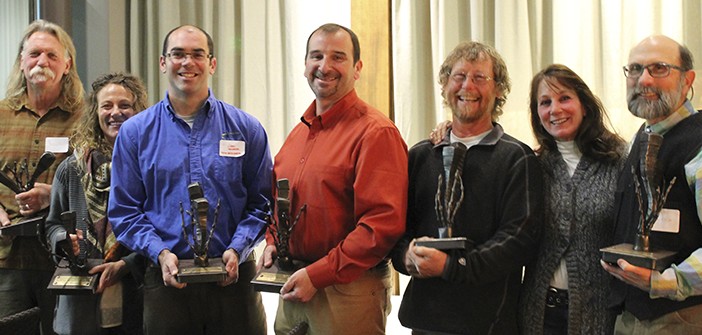The 2014 Sustainability Awards were announced by The Environmental Center recently at a celebration at the Cascade Culinary Institute’s Elevation Restaurant. The Environmental Center received 13 nominations and the winners were selected by a community review committee.
“Sustainability is a big, complex topic,” said Mike Riley, executive director of The Environmental Center. “Achieving it requires patience and perseverance in the face of often daunting obstacles. The Sustainability Awards celebrate the citizens, businesses, and organizations in our community that are dedicated to overcoming these challenges.”
The Environmental Center presented six awards:
• Individual: Bill Hull
• Small Business: Winter Creek Restoration
• Large Business: EartH20
• Organization: Bend Area Habitat for Humanity
• Special Award—Grassroots Action: Lisa Barnett
• Special Award—Sustainability Pioneers: Tom Elliot and Barbara Scott
Matt Shinderman, a previous award winner and key note speaker, explained the importance of the awards. “The individuals and groups we honor tonight are our local sustainability standard bearers. They stand on the shoulders of those who came before them and set the stage for the work we must do ahead. If we harness their energy, passion and commitment, we can create a future that’s good for people and the planet.”
An eight-member citizen committee reviewed 13 nominations and selected the final winners. The committee members were: Serena Bishop-Gordon, The Conservation Alliance; Bruce Sullivan, Base Zero; Daniel Brewster, Cascade Couriers; Susan Baker, Bend Garbage and Recycling; Karen Kassey, 2012 Individual Winner; and Rhonda Ealy, Strictly Organic Coffee Company; JoAn Mann, small business owners; and Jennifer Letz, Environmental Center Board of Directors. This year’s awards were designed and created by local blacksmith Kellen Bateham.
The nominees were scored on the basis of their leadership, innovation, and operating practices with regards to sustainability, as well as their community involvement and promotion of social equity. The nominees’ scores were compared to their peers for each category (Individual, Small Business, Large Business, and Organization) to determine the winner. The review committee also presented two special awards for grassroots action and pioneering efforts in the field.
The Environmental Center educates and advocates for a sustainable future in Central Oregon. We believe that sustainability hinges on how we live our daily lives: at home, at school and at work. The Center’s initiatives include educating kids, promoting zero waste, promoting energy efficiency and renewables, and serving as a hub for sustainability in the region. To learn more about The Environmental Center, visit them online at www.envirocenter.org or visit their facility at 16 NW Kansas Avenue in downtown Bend.
Individual: Bill Hull
What really stands out about Bill is how he leads his industry by example. Bill has shown mainstream builders that extreme energy efficiency can also be good business.
In the last three years, Bill and his WH Hull Company have built three Zero Net Energy Homes in Bend. Bill has been involved in every aspect of the planning, designing, material selection, building and detailing of these ground breaking energy efficient homes, ensuring that they are cost effective and built to last. His net zero homes not only produce more energy from solar than they consume but they are also cost comparable to other homes in their neighborhoods, providing a great model for other builders to follow.
In addition to his Net Zero Homes, Bill has also built several Earth Advantage “Platinum” homes, the highest Earth Advantage certification possible. He recently volunteered his time and expertise to create a series of “How To” videos on Zero Net building techniques for building professionals. Finally, like most good leaders, Bill also walks the talk. He lives in a home that won the National Association of Home Builders Single Family Custom Home award as part of their 2007 National Green Building Awards Competition.
Small Business: Winter Creek Restoration
Winter Creek Restoration, owned by Rick Martinson and Karen Theodore, is a full-service landscape and nursery company working exclusively with native plants of the dry land west.
Winter Creek strives to create healthy, functional landscapes. Their focus on above ground and below ground biodiversity allows a landscape to largely take care of itself without the need for chemical or artificial treatments. In nearly 20 years in the business, Winter Creek has never needed to fertilize a landscape or treat one for insects or disease.
Beyond great landscaping projects, Winter Creek has also impacted the community by helping to improve codes and by teaching sustainable landscaping to a variety of audiences.
For example:
• The City of Bend documented a 90% reduction in water use for commercial properties using practices developed by WinterCreek, and adopted several of their recommendations and design criteria into City code.
• Rick educates a wide range of audiences, including COCC, OSU, Oregon and Washington Tilth, The Living Futures Institute, and the National Association of Landscape Architects, to name just a few.
As one member of the selection committee put it, WinterCreek Restoration deserves this award “to recognize a lifetime of achievement. Their impact has been felt across all sectors of business, academics and government. While the idea of landscape as ecosystem may seem obvious to some, it’s been a huge, scary leap for the commercial landscaping industry.”
Large Business: EartH20
Steve Emery, CEO
EartH20 bottles and distributes 100% natural spring water, sourced directly from the aquifer that feeds Opal Springs near Culver, Oregon. We are recognizing EartH20 for their leadership and commitment to environmentally responsible innovation in the bottled water industry.
But first, a full disclosure. The selection committee initially disagreed about the merits of giving a sustainability award to a bottled water company. Some asked, shouldn’t we be encouraging people to fill up a reusable container rather than a disposable plastic bottle? Others pointed out that in 2012 we gave an award to Deschutes Brewery. Isn’t beer just a special, albeit iconic and intoxicating, form of bottled water in a disposable container? After a vigorous discussion, the committee agreed that there are lots of practical reasons that people want and need bottled water and that the purpose of these awards is to recognize companies that are truly reducing their environmental footprint and thus leading their industry by example. Which brought us right back to EartH20.
Here are some of the ways that EartH20 is reducing its footprint and leading the bottled water industry:
• In 2011, EartH20 was one of the first bottled water companies to convert single serve bottles to 100% recycled PET. Using recycled plastic uses 66% less energy, which means EartH20 has reduced its energy use by over 31 million kWh as of July 2014.
• In 2012, EartH20 began self-manufacturing its own bottles, substantially reducing its use of transportation fuels.
• By the end of 2014, EartH20 will be sourcing 100% of the recycled PET resin for their bottles from Oregon, further reducing transportation emissions and landfill waste.
• In 2014, EartH20 received an Ethical Sourcing certificate from the Safe Quality Food Institute, a rigorous social and environmental responsibility standard.
• EartH20 has pledged to the US Department of Energy’s Better Plants program to reduce its energy intensity by 25% or more in 10 years and enrolled in the Energy Trust of Oregon’s CORE program to help achieve that goal.
• A recently completed overhaul of their 5 gallon bottling line reduced waste water by 50%.
• And, EartH20 has signed the Oregon Business Climate Declaration, a call to action urging the public, policymakers and business leaders in the Pacific Northwest to seize the economic opportunity in tackling climate change.
Organization: Bend Area Habitat for Humanity
Chris Neumaier, Director of Operations
Bend Area Habitat for Humanity provides affordable homeownership and home repair services for low income families and individuals in Bend and Crook County. Since 1989, they have built more than 100 homes that house over 500 children and adults.
As you may know, Habitat received one of our inaugural Sustainability Awards in 2010. They are the first organization to receive a second award. Why? Because Habitat continues to lead by example, doing good for people and the planet through sustained high performance and new programs.
Here are just a few facts that demonstrate their continued commitment:
• The last 36 homes built by Habitat have received a third party certification, including Earth Advantage Platinum and Oregon Dept. of Energy’s High Performance Home.
• To date, nearly two dozen Habitat homes have either a solar electric or solar hot water system, or both.
• The ReStore, Habitat’s used and surplus building supply center, continues to grow, diverting more than seven million pounds of materials from the landfill over the last three years.
New or expanded since 2010 are the following programs:
• Habitat has added a new line of home repair and weatherization services that includes an energy audit before each project begins.
• The Restore is expanding to a new site on Third Street, where a large photovoltaic system will meet much of its electricity needs.
• Habitat continues to expand its homeowner education activities and topics, including a recent program on composting and raised bed gardening.
Special Award—Grass Roots Action: Lisa Barnett
Three years ago, Lisa had an idea: to create a space on the COCC campus for people to learn, collaborate, and share information about growing food in the high desert. Her nomination stood out to us for her grit and determination to make her vision reality.
Lisa worked incredibly hard to take her idea from a concept in a writing class to completion on the campus. Working with various campus and community entities, along with student clubs, she provided the vision, leadership and day-to-day drive to ensure that the garden became a reality on campus, securing over $65,000 of grants and donations of materials and services along the way. The COCC community is not the only beneficiary of the new garden. Food grown in the garden has been donated to students in need, the Bethlehem Inn, and the Shepherd’s House. And Lisa has shared what she learned through Sisters Park and Recreation’s “Keepers of the Seed” youth camp and Project Connect.
Lisa is a true sustainability champion who walks the talk and makes things happen that make a difference.
Special Award—Sustainability Pioneers: Tom Elliot and Barbara Scott
They have built one of the most environmentally friendly homes in the country, if not the planet. After many years of rigorous design and redesign, advocating for changes to government policy, and developing new, leading edge construction techniques, Barb and Tom have finally moved into their home, Desert Rain, and are now fulfilling the final year-long performance monitoring requirement of the Living Building Challenge.
The Living Building Challenge, or LBC, is the world’s most rigorous building standard. Rather than providing a menu of items that produce a score, the LBC has a set of performance imperatives that a home must meet. Imperatives like net positive water—use no more water than what falls from the sky on your site—an especially high standard in our high desert environment. Like a Red List of toxic materials that may not be used, period. And imperatives like inspiration and education—ensuring that the project creates and shares new knowledge and understanding. Equally important, the LBC offers no how to guidelines—you must figure it yourself, for the home you want to build in the place you want to live.
Barb and Tom have invested substantial time, talent, and treasure in Desert Rain. Why? Because they know that modern humans need to re-learn how to live lightly on the earth and that one important piece of that puzzle is reducing the footprint of our homes. They are true sustainability pioneers, generating new knowledge and techniques that will help shape a more sustainable future, in Bend and beyond.



